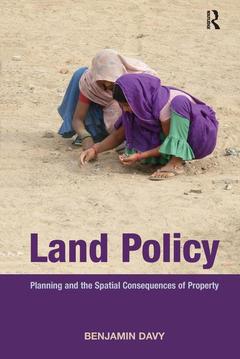Description
Land Policy
Planning and the Spatial Consequences of Property
Author: Davy Benjamin
Language: English
Subjects for Land Policy:
Keywords
Land Policy; common; Common Property Relations; property; Spatial Commons; relations; CRPD; spatial; Property Relations; commons; Cadastral Parcel; planning; Plural Rationalities; plural; Von Justi; rationalities; Private Property Relations; private; Western Sahara; sabarmati; Sabarmati Riverfront Development; Monorational Land; CEDAW; Rent Bid Curve; Mount Laurel; Land Rent; Sic Utere Tuo; Land Readjustment; Real Estate Appraisal; Property Rules; South African Supreme Court; Joe Slovo Community; Sabarmati Riverfront; Egalitarian Rationality; Property Allocation
Publication date: 04-2012
Support: Print on demand
Publication date: 07-2016
· 15.6x23.4 cm · Paperback
Description
/li>Contents
/li>Biography
/li>




